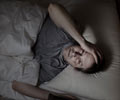Sleep activity in people of Africa was studied and results showed that delayed, but not decreased, sleep was found during the early stages of urbanisation.

‘Sleep duration has been reduced due to the use of artificial light at night and the use of electronic devices in the urban communities.’





It has previously been suggested that the post-industrial world is experiencing a sleep deprivation epidemic. The study was conducted by researchers from the University of Surrey, in collaboration with groups in South Africa, Brazil, Colombia and the USA.The Surrey-led research team found that although the people in the town retired to bed on average one hour later, they did not sleep less than the people in the village without electricity, because they also rose one hour later in the morning.
The study was performed by Dr Andrew Beale, who spent more than two years living in Milange before he returned to the UK to work as a research fellow at the University of Surrey.
He said: "I noticed that the sleep-wake patterns of people around me were much earlier than I was used to from the UK. There is an intense debate going on right now on how our ancestors might have slept, and how this was changed by industrialisation. Looking at the effects of urbanisation on these communities is one way of helping us understand what happens."
Professor Malcolm von Schantz from the University of Surrey, corresponding author, said: "What these findings indicate is that the delay in sleep timing that comes with access to electricity does not directly cause people to sleep less.
Advertisement
Associate Professor Laura Roden from the University of Cape Town, senior author on the study, added: "We will probably never know how our ancestors slept. But as urbanisation spreads across the globe, it is important to study how people's sleeping habits change. After they've changed, it will be too late!"
Advertisement
Source-Eurekalert















